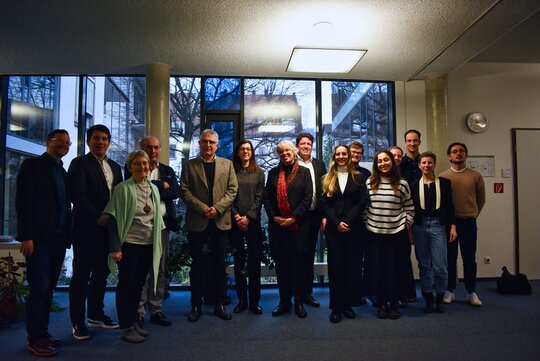The fact that the German education system has a problem with anti-Semitism is certainly nothing new. However, Dr Jens Brandenburg, Parliamentary State Secretary to the Federal Minister of Education and Research, was able to see for himself on Tuesday during his visit to the HfJS Heidelberg that there are also numerous suggestions for improvement and innovative digital ideas to counteract this obvious grievance. "I am personally keen to hear your impressions and mood here on site. I have already spoken with the Israeli ambassador in Berlin on 9 October and in the following days with the Jewish Student Union and other stakeholders. But anti-Semitism is also a problem here in my home region, the Electoral Palatinate," says Brandenburg.
The project extension application by Rabbi Prof Dr Birgit Klein, for example, is not only of interest to researchers. Here, researchers are collecting and analysing Jewish reactions to anti-Semitism. As Christian-Jewish rapprochement has so far been limited to theological questions and ritual practice has also been measured in Christian terms, the project aims to achieve greater understanding and acceptance through a very personal approach. In short videos, Jews explain their personal reasons for certain rituals - be it the wearing of a kippah, kashrut or observance of Shabbat and holidays. Jewish practice and religiosity are given faces and should therefore become more tangible.
Rawan Osman, a Syrian-Lebanese student at the HfJS who has been working as a peace activist for several years, would also like to make the topic, which is not only on her mind at the moment, more tangible and bring it closer: Israel-related anti-Semitism in and from Arab countries. "We must not forget that many refugee children and young people from Islamic countries have grown up with anti-democratic disinformation and a deeply rooted anti-Semitic world view," says Osman. The anti-Israeli stereotypes can often not be combated if knowledge is only taught in schools and primarily in German. "We need low-threshold information programmes that are academically sound and attractively designed. And above all: presented in Arabic." Osman developed "ArabAsk" together with Lukas Stadler, historian and Jewish studies scholar at the HfJS, who has already written a brochure for the Jewish community in Graz to prevent anti-Semitism, and David Lüllemann, Master's student at the HfJS, who has many years of experience in training courses to raise awareness of anti-Semitism. A project consisting of educational short videos for TikTok and Instagram, which are dedicated to individual aspects of controversial topics such as the Middle East conflict, Muslim anti-Semitism, conspiracy theories and anti-Islamic racism, and explain them in an appealing way in Arabic. In addition, the description of the videos provides references to academic literature in Arabic, German and English. All three students are hoping for a participatory effect among Arabic-speaking people in Germany who have so far remained silent.
However, Irina Kissin, wife of the Heidelberg community rabbi, knows that science alone cannot protect against anti-Semitism and its violent effects. She complains that the police do not adhere to security agreements. "I wonder whether the situation has got through to the people in charge," she says, feeling that she is not being taken very seriously. Along the lines of: everything has gone well so far. For example, teachers of a Jewish religious class, whose school building is completely unprotected, were advised to hold their lessons online.
The answer or advice in many places is to give way due to excessive demands or fear: due to a lack of protection options for Jewish pupils, for universities that refrain from public events on the topic of the Middle East conflict for fear of unrest and also advise against flying the Israeli flag. Students at Heidelberg University shy away from seminars at the HfJS so that they do not have to enter the university's premises. This may limit the potential for conflict and violence for the time being, but everyone present agrees that this tactic is going in the wrong direction.
While Irina Kissin calls for more civil courage in general, Prof Dr Johannes Becke, holder of the Ben Gurion Chair for Israel and Middle East Studies at the HfJS, advises more comprehensive history lessons in schools. "The region south of the Mediterranean in particular is very present in many school classes, but the teachers are helpless." Interdisciplinarity needs to be utilised more in academia, says Becke, "we need to talk about Israel-Palestine, the elephant in the room." Klein agrees that it is not only important that this knowledge is imparted to a small number of student teachers, but that the history of the Jewish people should also be anchored in their curricula nationwide, "not only in history, but also in theology. This should be a nationwide appeal to the universities' sense of responsibility to prevent anti-Semitism."
The Parliamentary State Secretary was dismayed by the accounts of the university members: "It is alarming that Jews no longer feel safe at German schools and universities. As a state and society, we must take local concerns seriously and ensure safety in these institutions." Anti-Semitism must also be combated at an early stage in schools, added Brandenburg. To this end, the Federal Ministry of Education and Research has set itself the goal of providing teachers with concrete support in their prevention work. "We want to further expand and deepen this work in close coordination with the federal states," he assured, referring to existing projects such as EMPATHIA, in which a core curriculum on anti-Semitism prevention is being developed for prospective police officers and teachers. Furthermore, an expert discussion on "Preventing anti-Semitism in education" took place at the end of October at the Federal Ministry of Education and Research, which was attended by representatives from research, practice and civil society as well as the Conference of Education Ministers and the Central Council of Jews.
However, the overriding feeling in the room remains that there is still a lot to do.




![[Übersetzen nach: English] [Übersetzen nach: English]](/fileadmin/_processed_/4/9/csm_Judaephobia_9b7df4f2b0.jpeg)
